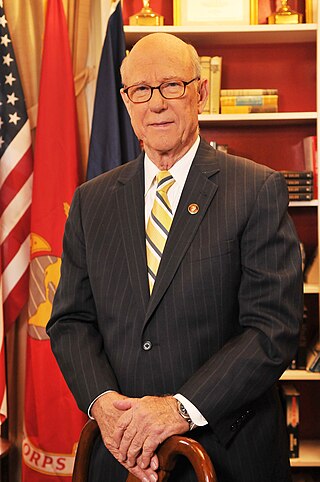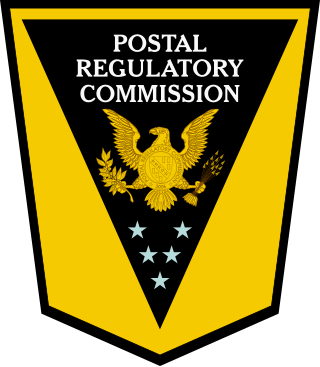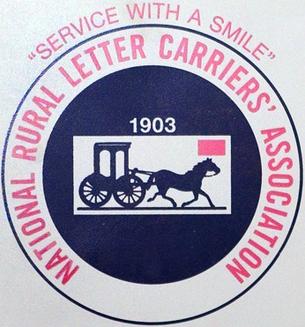
The United States Postal Service (USPS), also known as the Post Office, U.S. Mail, or Postal Service, is an independent agency of the executive branch of the United States federal government responsible for providing postal service in the U.S., including its insular areas and associated states. It is one of the few government agencies explicitly authorized by the Constitution of the United States. The USPS, as of 2021, has 516,636 career employees and 136,531 non-career employees.
The Board of Governors of the United States Postal Service is the governing body of the United States Postal Service (USPS). The board oversees the activities of the Postal Service, while the postmaster general actively manages its day-to-day operations.

Charles Patrick Roberts is a retired American politician and journalist who served as a United States senator from Kansas from 1997 to 2021. A member of the Republican Party, Roberts served 8 terms in the U.S. House of Representatives, from 1981 to 1997, before his election to the Senate.
The Employment Non-Discrimination Act (ENDA) is legislation proposed in the United States Congress that would prohibit discrimination in hiring and employment on the basis of sexual orientation or, depending on the version of the bill, gender identity, by employers with at least 15 employees.

Peter Anthony DeFazio is an American politician who served as the U.S. representative for Oregon's 4th congressional district from 1987 to 2023. He is a member of the Democratic Party and is a founder of the Congressional Progressive Caucus. A native of Massachusetts and a veteran of the United States Air Force Reserve, he previously served as a county commissioner in Lane County, Oregon. On December 1, 2021, DeFazio announced he would not seek reelection in 2022.

The National Association of Letter Carriers (NALC) is an American labor union, representing non-rural letter carriers employed by the United States Postal Service. It was founded in 1889. The NALC has 2,500 local branches representing letter carriers in all 50 states, the District of Columbia, Puerto Rico, the Virgin Islands and Guam.

John E. "Jack" Potter is the president and CEO of the Metropolitan Washington Airports Authority since July 18, 2011. He is the former United States Postmaster General and CEO of the United States Postal Service (USPS), having become the 72nd postmaster general on June 1, 2001. Potter is the second longest-serving postmaster general, following Gideon Granger.
The Deficit Reduction Act of 2005 is a United States Act of Congress concerning the federal budget that became law in 2006.

The United States Postal Regulatory Commission, formerly called the Postal Rate Commission, is an independent regulatory agency created by the Postal Reorganization Act of 1970. Like the Postal Service, it was defined in law as an independent establishment of the executive branch.

The American Postal Workers Union (APWU) is a labor union in the United States. It represents over 200,000 employees and retirees of the United States Postal Service who belong to the Clerk, Maintenance, Motor Vehicle, and Support Services divisions. It also represents approximately 2,000 private-sector mail workers.

The Pension Protection Act of 2006, 120 Stat. 780, was signed into law by U.S. President George W. Bush on August 17, 2006.

The National Rural Letter Carriers' Association (NRLCA) is an American labor union that represents the rural letter carriers of the United States Postal Service (USPS). The NRLCA negotiates all labor agreements for the rural carrier craft with the USPS, including salaries, and represents members of the rural carrier craft in the grievance procedure. The NRLCA's stated goal is to "improve the methods used by rural letter carriers, to benefit their conditions of labor with the United States Postal Service, and to promote a fraternal spirit among its members."

The James Zadroga 9/11 Health and Compensation Act of 2010 is a U.S. law to provide health monitoring and aid to the first responders, volunteers, and survivors of the September 11 attacks. It is named after James Zadroga, a New York Police Department officer whose death was linked to exposures from the World Trade Center disaster. The law funds and establishes a health program to provide medical treatment for responders and survivors who experienced or may experience health complications related to the 9/11 terrorist attacks.

The Tax Relief, Unemployment Insurance Reauthorization, and Job Creation Act of 2010, also known as the 2010 Tax Relief Act, was passed by the United States Congress on December 16, 2010, and signed into law by President Barack Obama on December 17, 2010.
The Middle Class Tax Relief and Job Creation Act of 2012, also known as the "payroll tax cut", was an Act of the United States Congress. The bill was passed by the U.S. House of Representatives on February 17, 2012 by a vote of 293‑132, and by the Senate by a vote of 60‑36 on the same day. The bill was signed into law by President Barack Obama on February 22, 2012.

The Coronavirus Aid, Relief, and Economic Security Act, also known as the CARES Act, is a $2.2 trillion economic stimulus bill passed by the 116th U.S. Congress and signed into law by President Donald Trump on March 27, 2020, in response to the economic fallout of the COVID-19 pandemic in the United States. The spending primarily includes $300 billion in one-time cash payments to individual people who submit a tax return in America, $260 billion in increased unemployment benefits, the creation of the Paycheck Protection Program that provides forgivable loans to small businesses with an initial $350 billion in funding, $500 billion in loans for corporations, and $339.8 billion to state and local governments.

Louis DeJoy is an American businessman serving as the 75th U.S. postmaster general. He was appointed in May 2020 by the Board of Governors of the United States Postal Service (USPS). Prior to the appointment, he was the founder and CEO of the logistics and freight company New Breed Logistics and was a major Republican Party donor and fundraiser for Donald Trump. DeJoy is the first postmaster general in two decades without prior experience in the USPS. His companies still hold active service contracts with the USPS, generating controversy over conflict of interest.
The 2020 United States Postal Service crisis was a series of events that caused backlogs and delays in the delivery of mail by the United States Postal Service (USPS). The crisis stems primarily from changes implemented by Postmaster General Louis DeJoy shortly after taking office in June 2020. The delays have had substantial legal, political, economic, and health repercussions.

The Postal Service Reform Act of 2022 is a federal statute intended to address "the finances and operations of the U.S. Postal Service (USPS)", specifically to lift budget requirements imposed on the Service by the Postal Accountability and Enhancement Act and require it to continue six day a week delivery of mail.











